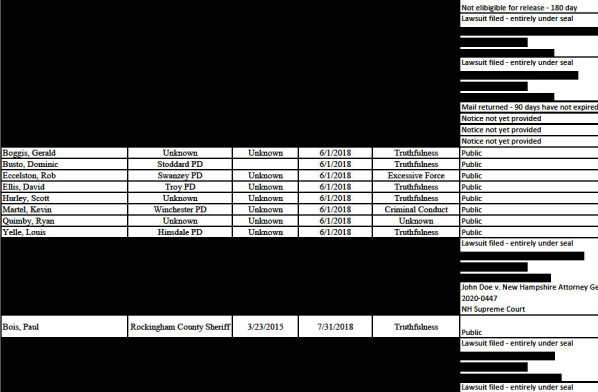See full compliance report here: https://indepthnh.org/wp-content/uploads/2022/01/20220114-ees-compliance-report.pdf
By NANCY WEST, InDepthNH.org
CONCORD – Attorney General John Formella has posted the first compliance report for the Exculpatory Evidence Schedule, also known as the Laurie List, showing 38 officers have filed confidential lawsuits in Superior Court arguing to get off the list.
The report, which was required to be filed by Jan. 1 but is dated two weeks later, says there are 265 names on the list, that 254 have been sent notices, and 75 have been made public so far with more expected in late March.
It shows that 10 people have yet to be contacted because they are dead, serving in the military overseas or there is no known address for them.
“This office is actively evaluating how to address these situations,” the report says.
This compliance report doesn’t include any of the 30 confidential names the attorney general has removed from the list since 2017 using internal protocols, half of them since the new law became effective giving officers the opportunity to file lawsuits to argue why they should be taken off. In those cases, it will be up to a judge to decide if the names should be removed.
The names were placed on the list because of sustained discipline in police personnel files for dishonesty, excessive force or mental instability.
The attorney general at first released 90 names, but then redacted 15 of them again because the office wasn’t aware they had filed in Superior Court.
The release caused a stir because well-known police officers, former police officers and police chiefs are now known to be on the list.
The reasons for the redactions included: officers had filed a lawsuit or had more time to file in court depending on when their names were put on the list or some had been returned to sender.
Criminal defendants are constitutionally guaranteed all exculpatory evidence, which is evidence that would be favorable to them. That could include a police officer’s discipline for dishonesty, use of excessive force or mental instability.
The list is critical to criminal defendants who were convicted but were not aware that an officer testifying against them had undisclosed exculpatory evidence in their personnel file.
If a criminal defendant finds out after their conviction that such evidence existed and wasn’t disclosed even many years later, he or she can petition the court for a new trial or try to have the charges dropped altogether.
Manchester attorney Robin Melone said the defense bar is still trying to determine how best to make sure criminal defendants know if there was undisclosed exculpatory evidence in their case.
“We still need the other half of the list, which better include some obviously missing names,” Melone said.
“We are having conversations about how best to look back. I think each attorney is doing their own review. I’m still concerned about old cases where clients don’t know,” Melone said.
There needs to be notification to those defendants, she said.
It is unclear why so much information has been redacted from those who filed in Superior Court. The attorney general indicated he is looking into the court’s reasoning.
“The court staff has advised us that these cases have been titled using pseudonyms (ie) John Doe or Jane Doe when the cases are filed and the court records for these cases are secured confidential files,” the report says.
The cases do not appear in the court’s kiosk look-up or in the online portal.
“To make sure we are treating these cases consistent with the court’s sealing procedures, case information on the attached redacted EES has been redacted, including case name, number and jurisdiction. We continue to seek clarification from the Superior Court regarding the sealing of these cases and will release additional case related information as permitted by the courts,” the report says.
The report is required to be posted quarterly under the law that went into effect Sept. 24, 2021. The law was the result of a compromise between the attorney general and ACLU-NH and five newspapers that sued in a public records lawsuit to have all of the names on the list made public.
The state Supreme Court ruled that the list is a public document and remanded it back to Superior Court Judge Charles Temple, who originally ruled that it was a public document, to determine if the officers on the list have a privacy interest.
That case remains in court although ACLU-NH, The Telegraph of Nashua, Newspapers of New England, Inc., Seacoast Newspapers, Inc., Keene Publishing Corporation, and the Union Leader Corp. have withdrawn saying they agree with the state that the new law makes the lawsuit unnecessary.
The lead plaintiff, the New Hampshire Center for Public Interest Journalism, which publishes InDepthNH.org, wants the case to go forward arguing the new law strikes the wrong balance between the public’s right to know about the functioning of law enforcement officers and departments where serious misconduct allegations exist versus the privacy of individual officers.





